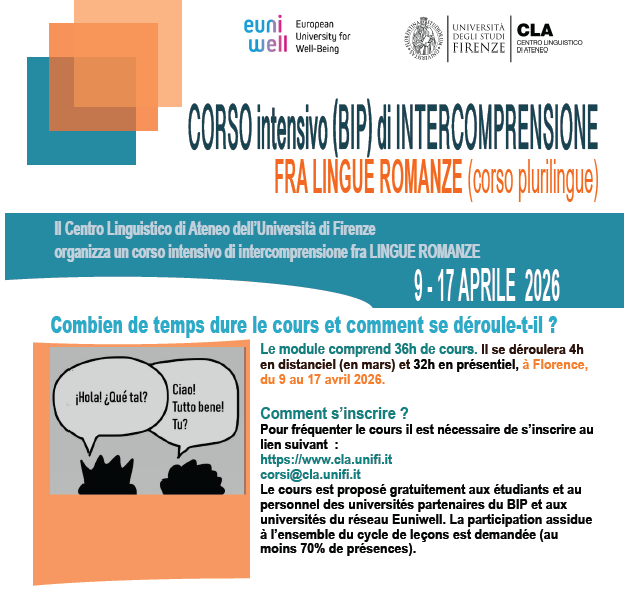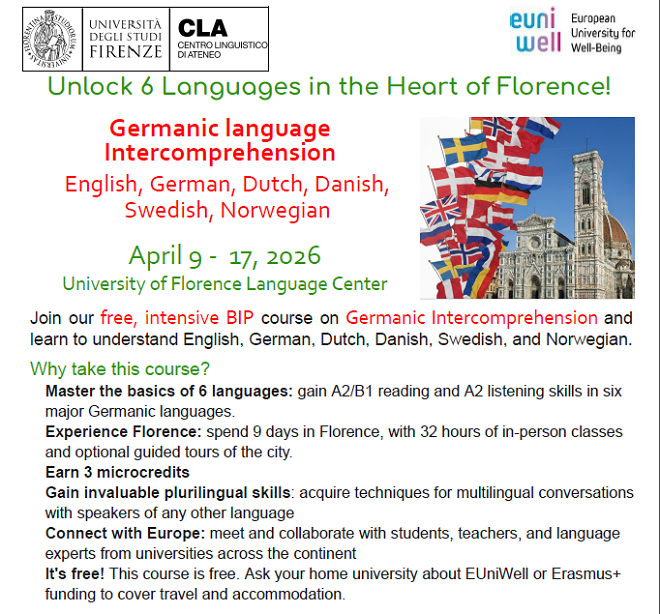Intercomprehension
Intercomprehension (IC) enables you to understand all the languages within a common family. It also provides techniques for communicating successfully in situations where each person speaks their own language; with neither speaker at a linguistic disadvantage, IC thereby embodies and enacts mutual respect and equality.
The CLA has been offering courses on Intercomprehension since a.y. 2020/2021.
The CLA's Intercomprehension expertise generated the Well-beIntercomprehension project of the EUniwell consortium, a network of European Universities whose mission is to improve the well-being of citizens through research, training and institutional engagement.
Dedicated site for the Well-beIntercomprehension project: www.europaic.eu
Currently, we offer Intercomprehension between romance languages and Intercomprehension between germanic languages.
Both courses give students open badges for university credits.
The CLA also does workshops on Intercomprehension: multilingual conversations, IC across romance languages, IC across germanic languages, and IC across both romance and germanic languages together.
By the end of the course, participants will:
1) understand written materials and spoken languages in the language family at an A2/B1 level
2) use new strategies for communicating with people who do not speak their language
3) understand the connections between related languages
4) build bridges with people from around Europe
5) differentiate the various languages of the same family and know their main characteristics
Blended Intensive Programme (BIP)
April 9-17, 2026 the CLA is hosting its annual plurilingual BIP courses for European university students, teachers and staff, with either a Romance or Germanic language family.
The courses are offered for free as an international Blended Intensive Programme (BIP): “Intercomprehension between Germanic /Romance languages”, multilateral agreement with european universities: INALCO, Paris (FR), Linnéuniversitetet (SE), Nantes Université (FR), Universidad de Murcia (ES), Universidade de Aveiro (PT), Université Libre de Bruxelles (BE), Universitatea Babeș-Bolyai (RO), Universität Köln (DE), Université Sorbonne Paris Nord (FR), Universidade do Porto (PT).
They are intensive courses, from 9/4/2026 to 17/4/2026: 4 hours online + 30 hours in person.
Mothertongue teachers present texts and audios/videos in their own language and provide techniques for deciphering them, connecting the words, grammar and sounds to the Romance or Germanic language family traditions. Additional activities include multilingual city and museum tours, plurilingual games and tandem sessions.
How to enrol:
-
BIP and EUniwell partners (contact your University for Erasmus+ mobility)
Intercomprehension between romance languages [BIP]
Intercomprehension between germanic languages [BIP]
-
UniFi students
Registration for free - The methods are indicated below.
The course on intercomprehension between Romance languages at University of Florence aims to develop participants’ skills in comprehending six tongues from the romance language family (catalan, french, italian, portuguese, romanian and spanish). Intercomprehension is a recent didactic approach but an ancestral way of communication: Interlocutors speak in their respective mother tongues and are enabled to understand the language of the other interlocutors by the technique of intercomprehsion, without using a lingua franca. Intercomprehension fosters diversity, multilingualism, respect of difference and well-being.
Teacher of the course: Dr Hugues Sheeren (french), with the collaboration of Dr Monica Molina (spanish and catalan) and other experts for romanian and portuguese.
- Next course will be scheduled from 9/4/2026 to 17/4/2026
|
 |
Intercomprehension (IC) means being able to read texts in other languages of your same language family (in this case, germanic) and to have a multilingual conversation between speakers of different languages, where each interlocutor speaks their own germanic tongue. In this course you will both learn IC interactive strategies and gain language competency in the 6 germanic languages covered: english, german, norwegian, swedish, danish and dutch. The course’s main language is english (and german, depending on the language ability of the participants); its teachers are native english and german speakers. To take the course you should be able to communicate in english and, preferably, know a little of another germanic language; also, please join if you are a native or proficient user of any germanic tongue. We will also have guest IC specialists, who are native speakers in other germanic languages, to do activities with the class,
Teachers of the course: Dr Jessica Thonn (english), Dr Petra Brunnhuber (german) and other experts.
-
Next course will be scheduled from 9/4/2026 to 17/4/2026
If the course is full, UniFi students can go on a waiting list. They will be recalled if new places become available |
 |
Last update
11.12.2025
